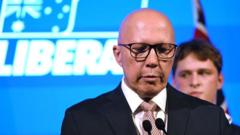Dutton's resignation from Parliament as both leader and member signals a critical juncture for the Liberal Party. Dutton's defeat by Labor's Ali France in his Queensland backyard has prompted calls from within for a thorough review of leadership and strategy. "We have to listen to Australians,” said Liberal MP Keith Wolahan, who is also facing uncertainty over his own future. The party suffered particularly severe losses in major urban centers such as Sydney, Melbourne, Brisbane, and Adelaide.
Critics attribute Dutton's struggles to his leadership style and the broader "Trump effect," citing hesitance among voters towards him. Former adviser Andrew Carswell bluntly described the defeat as a "complete catastrophe for the Coalition," suggesting it reflects a clear rejection by Australian voters.
In the face of this crisis, discussions around potential successors have begun, with names like shadow treasurer Angus Taylor and deputy leader Sussan Ley emerging as candidates for the top job. However, without a definitive leader to guide them, the Liberal Party faces a challenging road ahead to recover lost support and reshape its identity to resonate with voters.
As the country looks towards the next election in 2025, the Liberal Party's ability to adapt and reconnect with the electorate will be crucial in determining its future in Australian politics.
Critics attribute Dutton's struggles to his leadership style and the broader "Trump effect," citing hesitance among voters towards him. Former adviser Andrew Carswell bluntly described the defeat as a "complete catastrophe for the Coalition," suggesting it reflects a clear rejection by Australian voters.
In the face of this crisis, discussions around potential successors have begun, with names like shadow treasurer Angus Taylor and deputy leader Sussan Ley emerging as candidates for the top job. However, without a definitive leader to guide them, the Liberal Party faces a challenging road ahead to recover lost support and reshape its identity to resonate with voters.
As the country looks towards the next election in 2025, the Liberal Party's ability to adapt and reconnect with the electorate will be crucial in determining its future in Australian politics.

















